Most preppers keep a generator tucked away as their ace in the hole. It’s the safety net, the one thing that makes them feel ready for the day the grid goes dark. On the surface, it makes sense: you lose power, you crank up the machine, and life goes on.
The truth is that the generator you bought as your “insurance policy” can easily turn into a death trap with your name on it, in a real collapse.
The cold, hard facts are simple: gas and diesel generators are noisy, fuel-hungry, short-lived, and dangerous. They offer a false sense of security while quietly putting a target on your back.
Noise
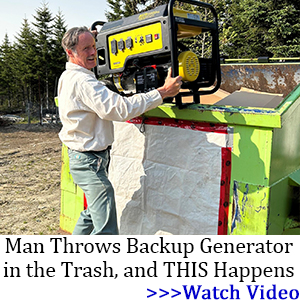 Picture this: It’s been three weeks since the lights went out. The initial chaos has settled into an eerie quiet. No hum of air conditioners, distant highway noise, or electronic buzz from streetlights. Just… silence.
Picture this: It’s been three weeks since the lights went out. The initial chaos has settled into an eerie quiet. No hum of air conditioners, distant highway noise, or electronic buzz from streetlights. Just… silence.
Now imagine firing up your generator.
BRAAAAAAAP!
That sound basically shatters operational security for miles. In the dead calm of a post-collapse world, your generator’s roar carries like a gunshot. Every desperate soul within a mile radius now knows exactly where to find the guy with fuel, power, and probably food.
You might as well paint a bullseye on your front door.
Think about it tactically: In a world where people are killing over scraps, you just announced that you have abundance. How long before they come calling? And how many of them will there be?
Fuel Dependency
Here’s the math that generator salesmen don’t want you to do:
- Your 5kW generator burns 18 gallons per day running 24/7
- That’s 540 gallons per month
- 540 gallons weighs over 3,200 pounds
- Storage cost: $1,500+ just for the fuel
- Fire hazard: Extreme
But here’s the real kicker: gasoline starts degrading in 3-6 months. Even with stabilizers, you’re looking at 1-2 years maximum. Diesel? Maybe 18-24 months if you’re lucky and store it perfectly.
So you’re betting your family’s survival on a fuel supply that’s literally rotting in storage, assuming you can even acquire and store hundreds of gallons without turning your property into a potential fireball.
When the trucks stop rolling and the pumps run dry, your generator becomes a very expensive, very heavy paperweight.
The Maintenance
Generators aren’t just fuel-hungry. They’re also mechanical prima donnas that break down at the worst possible moments.
Carburetor gummed up? You’re done. Spark plug fouled? You’re done. Oil pump fails? You’re done.
And good luck finding replacement parts when Amazon isn’t delivering and auto shops are boarded up.
Even if you’re mechanically inclined, generators require constant maintenance:
- Oil changes every 50-100 hours
- Spark plug replacement
- Air filter cleaning
- Fuel system maintenance
- Carburetor adjustments
Miss any of these, and your “reliable” backup power becomes dead weight when you need it most.
Health Hazards
Generators don’t just make noise. They make poison.
Carbon monoxide (CO) is an invisible, odorless gas that kills quietly. One portable generator can produce as much CO in an hour as 450 cars. In the United States, over 770 people died in the last decade from generator-related CO poisoning, and thousands more were hospitalized.
Running a generator outside doesn’t make you safe. If it’s near a window, vent, or door, the gas can still seep inside. And running it indoors, in a garage, or even under a carport is a death sentence.
On top of CO, generators also bring risks of burns, electrocution, and fire. One spill while refueling, one spark in the wrong place, and your safe haven turns into a funeral pyre.
Smarter Alternatives That Actually Work
Throwing your generator in the trash doesn’t mean living in the dark. It means choosing systems that actually work in the long run—quiet, renewable, and low-tech solutions that won’t betray you when the grid is gone.
The “‘Navy SEAL” Solution
Imagine waking up after a grid-down disaster and realizing your lights still work, your fridge is cold, and your family isn’t stumbling in the dark. That’s actually possible now, all thanks to a breakthrough survival generator that’s both affordable and simple enough for anyone to use.
Unlike noisy gas generators that guzzle fuel you may not have, this system is designed for preppers who need reliable power without constant refueling. It can keep the average American home running for up to three days straight, providing energy for essentials like lights, communication devices, and refrigeration.
The full details are available in A Navy SEAL’s Bug-In Guide, by survival expert Joel Lambert. Click here and get one of the last physical copies available!
The Modular Backyard Power Plant
Instead of burning gallons of gas, The Modular Backyard Power Plant captures the sun’s free energy and turns it into reliable electricity. It’s designed with preppers in mind, not city slickers with deep pockets.
Safe to Run Anywhere: There is no toxic exhaust, risk of poisoning your family, and no roaring motor to give away your location.
Simple to Build: Even if you’ve never worked with electricity, you can put this together. It’s safer than changing a light bulb, and the instructions walk you through every step.
Maintenance-Free: Once you set it up, it just works. No oil changes, no carburetor cleaning, no tinkering. You place it where it gets sun, plug in your appliances, and let it do its job.
This is the kind of system you can count on for months or years, not just a few noisy hours.
Solar Kits
You don’t have to go all-in on a massive solar farm. Modular solar kits give you options.
Large systems can power freezers, fridges, lights, and tools, keeping your household running.
Smaller kits can charge radios, phones, flashlights, and even run atmospheric water generators.
Personally, I’ve been using solar panels to power the water systems I integrated into my homestead.
 The Water Freedom System, my go-to solution for bugging in, uses a simple solar panel to pull moisture straight out of the air and turn it into clean, drinkable water.
The Water Freedom System, my go-to solution for bugging in, uses a simple solar panel to pull moisture straight out of the air and turn it into clean, drinkable water.
The good news is, you don’t need a massive or expensive solar array to make it work.
Right here, you can find all the details on the exact type of solar panel you’ll need (trust me—it’s cheap and simple to set up), along with the other components that allow the system to generate 20–30 gallons of water every single day.
The same principle powers my favorite portable generator, which I also built at home using the step-by-step plans available on this page.
From the start, it’s important to point out that this is a backpack-sized water generator. That means it’s compact, lightweight, and easy to carry wherever you go. Naturally, the solar panel it requires is also small and portable.
Here is the full plan, based on the very same techniques the U.S. military has used for years on dry, hostile battlefields across the world.
Every watt of solar power you generate means one less drop of gasoline you’ll ever need.
Rocket Stoves
For cooking, a rocket stove is unbeatable. It burns twigs, branches, or scrap wood with incredible efficiency. The design creates a hot, clean burn with very little smoke, which helps you stay hidden.
They’re cheap to make, nearly indestructible, and they’ll keep working long after every gas can is empty.
No-Electricity Alternatives – The Amish Were Right
Sometimes the smartest option isn’t replacing electricity—it’s learning to live without it. For over 300 years, Amish communities have thrived without generators, without grid power, without the mechanical dependencies that make modern life so fragile.
They use:
- No-Electricity AC Units, Washing Machines and Fridges
- Root cellars for refrigeration
- Hand tools for work
- Gravity-fed water systems
- Wood for heat and cooking
- Oil lamps for light
By integrating just a few of these methods, you can stretch your resources, reduce your risk, and free yourself from total dependence on fragile technology.
>> Get The Amish Ways Book (Coupon Number X43LC2V Can Only Be Used Today!) <<
Final Thoughts
If the power goes out for a night or two, a generator might help you get by. But when the grid collapses for good, that machine becomes a liability.
Noise, fuel, fumes, and fragility make it a trap—not a plan.
Real survival means cutting the cord on false security and investing in systems that actually last. A Modular Backyard Power Plant, solar kits, rocket stoves, and no-electricity alternatives aren’t just backups—they’re the foundation of true resilience.
Because when the lights never come back on, the last thing you want is to depend on a machine that makes you a target, burns through your supplies, and poisons the air around you.
Throw the generator in the trash. Your survival depends on it.
Whether you stick with a traditional generator or move to alternative options, you can’t ignore the threat of an EMP. Every system is vulnerable unless you take steps to shield it. The good news is, you can protect your most valuable electronics with the right methods. You can find everything you need to keep your gear safe when an EMP hits if you click RIGHT HERE.
You may also like:
I Lived Without Electricity For A Week. Here’s What Happened
This Smart Box Cuts Your Power Bills By 65% (Video)
6 Ingenious Projects for Endless Hot Water Without Electricity

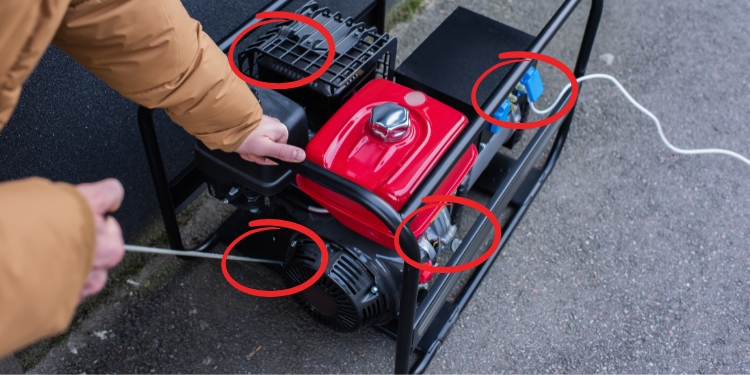

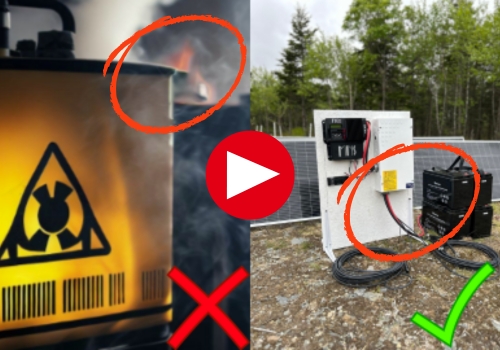
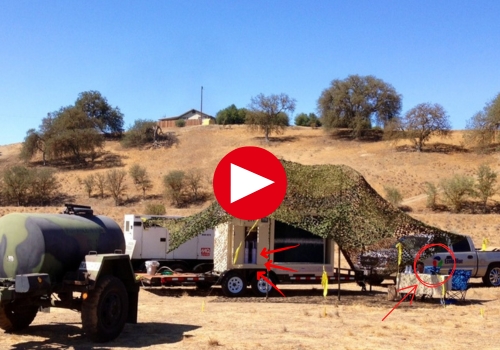
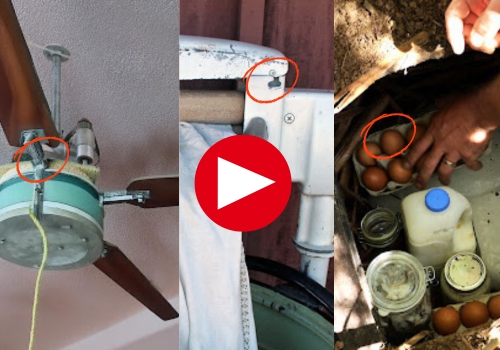







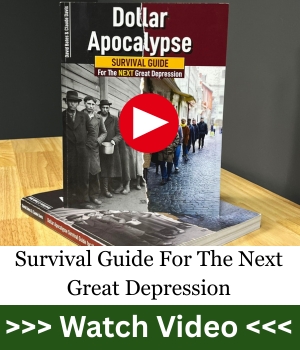












we live in the deep south. we keep ours because of hurricanes. we also have a fully tested 3 kw solar system in the can that we can fall back on for long term power.
I use mine in black outs and have solar back up.
Still connected to the grid but have use both generator and solar at the same time to run everything and it held up pretty good.
It was work and having multiple electrical cords everywhere.
But yes will not run my generator when the crap hit us in the face. Must go gray, drop out of site and only come out as needed.
It’s coming…
stay sharp
Remember to determine and monitor the 80% degradation curve (date) on your solar panels! Solar panels wear out just like everything else.
I doubt the SEALS invented the “solar generator ” but as with many of these articles, they’re just an opportunity for a shameless plug. There’s no need to spend hundreds or thousands on a commercial solar generator. They are easy to build and often with higher capacity and less money than you can afford to send to China. Videos are available. Pick a 100 to 300 AH LiFePo4 battery, a reliable 1000 to 3000 watt pure sine wave inverter (high frequency are cheaper and lighter). Add a precharge circuit using a 25 ohm 25 watt resistor. Build it in a rolling toolbox, piece of starboard or open air…your choice. Pretty…no. ultra portable…not really. Cost effective…most definitely.
Farmer, I wish you lived next door – I would ask your help in learning, the details that are not in an e mail or web post
How about this? IF everything goes down and you still have vehicle batteries and 1 or 2 small folding solar panels, why not hook those batteries up to the solar panel(s). It will take a while to charge them, but so what? Those solar panels are set up with the clips and such. I can charge my rechargeable batteries off the small solar panels. We have a camper that is solar/propane. Never have to use a generator. By the time the propane is gone, we will have eaten all the refrigerator/freezer type foods, so life will get either more simple or more complicated- depending on how you look at it.
Except for all the fancy plugs on those “electric” generators, I don’t see a lot of difference. They are just big batteries…cheaper to use car or RV/cruising boat batteries (deep cycle).
The concept that CAddison proposes is valid but do your research now and understand what has to occur with a “string” of batteries particularly during charging. You will want a “charge controller” in that circuit. If you do not have one then you will be managing the charging manually with meters to optimize the longevity of the batteries, Not difficult but required knowledge.
LIES, LIES, AND DAMNED LIES YOU DON’T RUN 24/7 BUT JUST ENOUGH TO RUN PUMPS AND RECHREDE BATTERIES. YOU DON’T NEED 5K WHEN 1 OR 2K WILL DO THE JOB. THERE ARE INEXPENSIVE 10 YEAR STABILIZERS THAT WORK. I HAVE MILITARY JERRY CANS THAT HAVE BEEN IN STORAGE FOR 20 THAT ARE JUST FINE
what are the stablizers
PRI-G GASOLINE, PRI-D DIESEL ; $34 ON AMAZON , WORKS FOR E-10 BUT I USE PREMIUM FOR LONG-TERM STORAGE , THIS BOTTLE TREATS 512 GALLONS
RECHARGE BATTERIES
The information seems to be targeting city or suburban dwellers versus rural dwellers. A generator with a functional muffler does not attract much attention on a five acre or larger property. Rural issues with gangs or looters are different and addressed in other prepping posts. Historically rural pre-grid generator systems (pre-1950s in some areas) were periodic runs not continuous run solutions. You ran the generator to do heavy chores or for “luxury” from sundown to bedtime (1 to 2 hours). If you combine solar, wind and generator in an off-grid system, think of the generator as the “backup” battery charger when the solar and or wind cannot keep up. This supports the idea of periodic runs versus continuous run situations. One additional piece to know for any off-grid electrical system you buy or create is the wattage recharge or recovery rate. Basically is takes four to ten times longer to recharge a storage system (battery) than it takes to discharge it (limits of the battery chemistry). This makes the battery selection and sizing the critical and expensive decision. Also why a heavy focus on low wattage lifestyle (light, communications, entertainment) with nonelectric food storage, cooking, and heating is a major goal. This discharge versus charge concept is demonstrated by EVs where you drive 300 miles over 5 hours (discharge rate) but it takes 12 to 15 hours to recharge the vehicle batteries without special equipment (120VAC). Same effect will occur in any alternative system you make or buy, it can be used faster than it can be replenished so plan accordingly. Note those “home solar roof panel grid sell back systems” WITH NO BATTERIES do nothing for you in an outage. Second note: if you build your own “car alternator – generator” power system the design must have a good battery with some level of charge on it in the system to activate the field coils in the modern alternator. Permanent magnate “generators” from very old cars do not need this, trying to save you a major headache figuring that out!
Ozark & Ron
Good points !
Ron, Truth you speak. But, I do worry, that gas has a LIMIT, Cars, AG equipment, charging, chilling food, heat. Communications, with WHO ? On day 375, can you travel any distance to meet the who you communicated with ? Better be short wave, dont expect cell towers to survive, or have power, if you dont. I would like power on day 500.
Ozark
truth, run LITTLE. DONT plan to run your kids game system. Dig a nice hole, like 8 ‘ diam. and dig it 4-7 ‘ deep, Further, stack some hay bales around the top, THATS a muffler you can count on. Wind driven alternator / Gen, like they did in 1911 rural Minnesota, gave them enough power. Wind, Solar, gasoline/ diesel, Sounds like the way to cover the bases, especially when you have a breakdown. Dont forget, Solar panels wear out, mostly by abrasion.
Also, Todays batteries dont have the same OLD materials, so they dont last for spit either. 12 volt lead acid, wind driven Gen, may be the longest lasting most useful system. It doesnt take much of a battery to buffer a wind driven Gen.
The best thing that could ever happen, we leave all our prep’s for our grandchildren ( as they are young and their parents are fully prepped )
PS, for the professor, if she is reading ‘ ‘ ‘ ‘ ‘ ‘
There are so many things that I have inherited from my parents and grandparents that are a wonderful collection of manual tools. Basic things that enable one to carry on throughout the day without electricity. In position, and peppered throughout the house, they are ready to call up into action at a moments notice. No electricity? No problem! By leaving your preps to your grandchildren, you are giving them the best inheritance.
Kre – Agreed on lead acid batteries and they can be rejuvenated chemically! Solar panels do wear out and I do not have the tech to make my own when they do! We enjoy the luxury of installing permanent systems on our farm property so our big generator – welder combo is in its own power shed with muffled exhaust, and transfer switch, It’s a Hobart gen / welder that was half the cost spent while the other half was making it all look professional and match the architecture. I am still searching for the holy grail of prepping, a steam engine – generator combo! Looks like I will eventually have to build my own, but at least for me it can be a stationary design. For anyone with leads on a system or design anything from a 1hp steam engine turning an automotive alternator to charge a string of deep cells to a 10hp 240VAC (steam is big on torque so need less HP) 10KW setup would be usable.
Kre – for us “communications” now and after events includes a lot of Citizen Band Radio (base units, vehical units, and walkies) for family around the farm and neighbors. Again been using them for years long before cell phones were blended into the mix. If we have to go back to local light signals (oil lamp with a shutter) or regional telegraph we really have hit the reset button!
ontext changes everything. In a rural setting, where properties stretch out and background noise is minimal, a properly muffled generator isn’t the same beacon it would be in a tight suburban block. Out in the country, the bigger threat isn’t your neighbors hearing the hum, it’s long-term resource management. Historically, pre-grid rural systems never ran continuously; they ran in bursts for chores or brief evening comfort. That rhythm, short, strategic runs, still makes sense today.
And your point on recharge vs. discharge is critical. Whether it’s EVs or homestead batteries, people forget you can drain power four to ten times faster than you can replace it. That’s why solar and wind should carry the daily load, with the generator acting as the “emergency charger” when nature falls short. It pushes you toward a low-wattage lifestyle: lights, radios, maybe entertainment, but never betting your survival on high-demand electric luxuries. Long-term resilience isn’t about mimicking grid life; it’s about designing systems that respect their limits and stretch every watt.
Ozark
you remind me of a friend that retired from NASA.
LOVE steam generator !
OUT of town, you can run it and risk the smoke trail, after year 1, you can trade charging service. dont forget to harvest the heat in winter.
DUAL Fuel, another way, start a gas engine on gas, then swap to running kerosene or diesel, like on a 1930 JD tractor, wont work on a modern car engine , but an old tractor, running a PTO generator on the Farm, good as gold
Actually, running a Generator can help you blend in EARLY in a Blackout. Many people who AREN’T Preppers have a Backup Generator just in case.
Case in point. After Helene, power was out across the City for about a week. For the first 2-3 days, EVERYBODY seemed to be running a Generator, including yours truly.
After about the 3rd day, generators began falling silent. Only a couple of Stations had fuel, and they were restricted to CARS ONLY.
My Ecoflow kept my fridge running, and my phone charged. But my Generator was silent, so nobody knew I still had power.
So don’t throw the Generator away. Keep it for the first couple of days, and then transition to your other backup once the fuel runs out.
That’s a sharp observation! Early in a blackout, the roar of generators is just background noise because everyone is burning fuel. In those first days, running yours won’t raise suspicion, and it keeps the essentials alive, fridges cold, phones charged, nerves calm. But as fuel stations dry up and the hum dies out across the neighborhood, noise discipline becomes survival. A single running motor on day five is like a flare in the dark.
That’s why blending tactics matter. Use the generator while it’s still “normal,” then shift to solar, batteries, or low-profile alternatives once silence falls. It’s not about throwing the generator away. It’s about using it wisely, knowing when to stand with the herd and when to disappear from it. Early chaos is one game, long-term survival is another.
GENERATORS, day 2, leave them unguarded and they are GONE
About generators:
A LOT of variables there.
You can muffle the sound quite a bit but never ever use them at night.
You use them only to recharge your solar batteries.
Diesel can last 5 to 20 years, and so can Kerosene.
Gas can last from 3 months to 5 or more years with the RIGHT stabilizer added annually.
If you can get a dual fuel generator, you may be better off, especially if one of those fuels is alcohol, which from what I read is fairly easy to make.
What good is a refrigerator or freezer when you ate up all your FOOD?
Furnace – you need a big generator and loads of fuel to power an electric furnace.
Gas furnaces – well pipes won’t be pumping natural gas in a long term SHTF scenario.
Fuels oil – yep the fuel lasts a long time BUT once it is used up, no more fuel. Same with propane.
Don’t you think OTHERS will be after those same things?
All the power you need after everything runs out is for basically light for the most part, pumping water from a well MAYBE, sump pump is necessary, and on rare occasions (like checking things for OPSEC).
Go to SLEEP when the sun goes down and get up when the sun comes up. You got no reason other than OPSEC to be up at dark. In the daytime, hunting/scavenging, tending a garden, educating the kids, similar.
About cooking – author hit is right about using rocket and twig stoves.
DO NOT cook at night unless it is raining.
Avoid cooking in the daytime unless the wind is blowing fairly well or raining.
Food odors do travel and you want them very sell dispersed/diluted so people don’t “follow their nose” right to your house.
Last thing you want to do is fend off groups of desperate people after your supplies and women.
And yes, females are a very valuable commodity. Almost as valuable as food and fuel.
They can even be traded for things.
Comms generally will not be needed as everyone else’s comms will be without power.
Be very careful about governments – they will KILL YOU just to get your stuff, just like desperate people will. Make sure you booby-trap your stuff to the extreme. You can at least cull THEIR ‘herds’ as it were.
Dog eat Dog scenario. Kill or be killed.
After a year or so, most people will be dead and survivors will pretty much be self sufficient anyway. They may be your best ally for bartering.
Interesting comment about females. I hope in jest. Quite a lot are combat trained and quite deadly. Just saying.
Generators are tools, not solutions, and you’re spot on that variables matter. Fuel type, noise discipline, and purpose all decide whether a generator buys you time or paints a target on your back. Diesel and kerosene hold up far longer than gasoline, but even the best stabilizer has limits. And yes, powering big-ticket items like furnaces is a fantasy unless you’re swimming in fuel. better to use that juice for the essentials: recharging batteries, pumping water, or brief lighting. The best prep isn’t more fuel; it’s learning to live with less reliance on it.
And you nailed the bigger point: OPSEC is survival. Cooking smoke, generator noise, even light at the wrong hour will draw desperate eyes. In a grid-down world, food, fuel, and women will be treated as commodities by the worst kind of scavengers and predators. That’s why stealth cooking, quiet power use, and hardened defenses matter. But beyond the chaos, after the initial die-off, the ones left standing will be the ones who planned lean, stayed sharp, and built skills. At that stage, survivors won’t just be competition, they’ll be your best chance at barter and rebuilding something worth protecting.
crazysquirrel and All – A side discussion from the original topic but worth repeating as general understanding. A typical assumption is unprepared individuals will never travel more than 100 miles before they expire. Urban dwellers will remain in place for about a week until looting strips everything then they will venture out (they only know the suburbs have more stuff) but will move slowly due to more looting as they go. They will never make it past the Suburbs. Suburbanites with stay put until their individual supplies run out, then venture out to seek new supplies and run into the Urban people who have moved in to the area to loot, that means they will never leave the suburbs. So the only people who will ever travel any real distance are true preppers and the outer edge suburbanites who have some exposure to farmers markets and see “cows” sometimes. The edge suburbanites will follow major roads to “small towns” thinking that is where the country people live so their travel may be a longer linear distance but not very wide penetration to the areas they pass. See the CDC pandemic spread tables as a guide. The true rural areas may reset to 1955, 1923 (restart the TVA), or even 1888 so relationships and community in those rural areas are important to manage.
Dont be fooled , Not every area or everyone is the same , one size never ever fits all
So Use Common Sense
NO one who has a generator uses it 24/7
Then when in use make very good use , charging batteries, creating ICE , or AC as needed
But Planning is important
as when, if , and only if your left Behind , you wont Care , Survival will be most essential
Yes , you will have Gangs, Thugs, Thieves, Hoods, the like roaming to see who is Fair Game or easy targets
But that is only for anyone who rebels against the Control coming by the anti God, Anti christ, Society
Endentered Servant s who will do what ever for thier food or lively hood
The rest will be Raptured and will leave it all behind for the newness of life, and eternal life with our savior JESUS CHRIST who offered Freely to all before Rapture a Chance to escape .
Much Deception , Much suffering for those who chose to go into hidding and Do it thier way .
That is Why , Now is the day of salvation , not tomorrow , today if you will soften YOUR heart , open the Door , Let Christ Jesus Dwell in your heart , hear his voice , follow his ways, learn his Word , by Faith you will be saved from the coming Wrath .
Jesus Christ Love s YOU before, and after , Love is NOT like any other , Pure ness , spiritual , NOT physical
You’re right — one-size planning is a lie people tell to make prepping feel tidy. Reality is messy: geography, community, and conviction all change the playbook. Use commonsense first. don’t run a generator 24/7, prioritize charging batteries, making ice, preserving food, or powering what truly matters and rotate supplies so your kit doesn’t become useless junk. Expect threats and opportunists when systems fail, but assume most problems are solved by preparation, not panic; hard choices become easier when you’ve practiced them ahead of time.
At the same time, faith and moral clarity matter to a lot of people, and they shape how folks prepare and who they’ll protect. Whether you frame it as spiritual readiness or practical resilience, the core is the same: don’t wait. Build skills, secure water and food, learn to move energy without the grid, and strengthen the people around you, because survival is as much about community and conviction as it is about gear.
Great Thought Provoking article, that proves the point that many of us are too short sighted and everyone needs to think, plan and execute for the long term. Hard copy paper books and instructions; skills that are practised and in-bred; hardened shelters, homes, workshops made of stone, not wood; food producing plans, seeds, crop rotations, fertilizer, gardening tools that dont run on gas and focus on crops/production next year and the year after. For me it starts with the water in the lake 300 feet away and getting it to my garden 100 feet uphill without electricity.
Exactly. Most people think prepping is stacking cans in the basement and calling it a day. But the truth? Long-term survival is about systems, water without pumps, food without trucks, heat without gas. Stone and soil don’t lie, but the grid does. You nailed it: if you can pull water uphill without electricity, you’re already ahead of 90% of the population. The rest? They’ll realize too late that “short-term” thinking is exactly what the system trained them for.
Tony, get a hand pump and garden hose. fill your water tank ABOVE and let gravity deliver to taps at house and garden. ALSO, make some forms and fill with winter lake water and your ice blocks are already up the hill ready to place in your ICE HOUSE.
hope you have all thought about harvesting ICE or making massive blocks and storing for summer
We’ll be running the generator long enough to can everything in our 3 freezers! Be using propane and kerosene for that! Then we go to a Bluetti solar system for lights, charging tools and batteries!